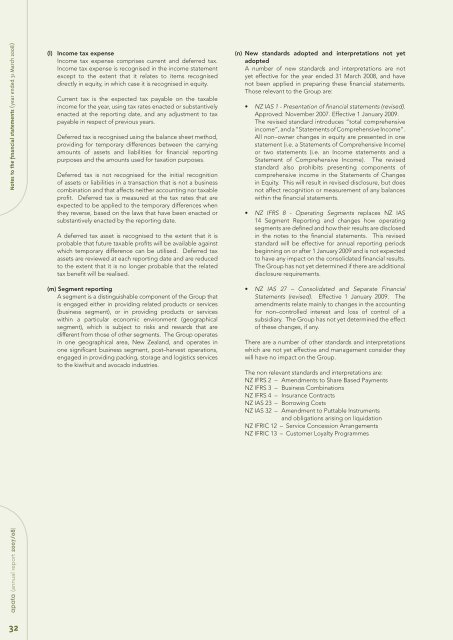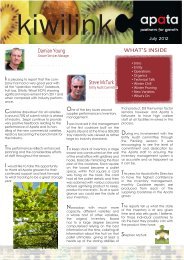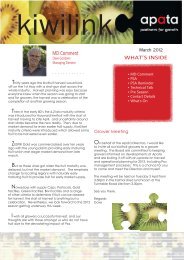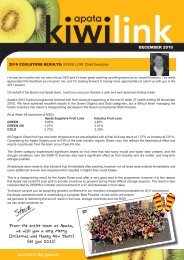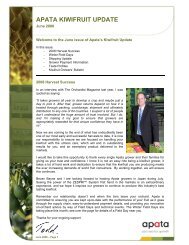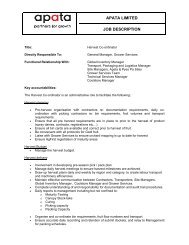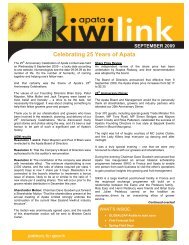Apata Limited and Group
Apata Limited and Group
Apata Limited and Group
You also want an ePaper? Increase the reach of your titles
YUMPU automatically turns print PDFs into web optimized ePapers that Google loves.
Notes to the financial statements (year ended 31 March 2008)<br />
apata (annual report 2007/08)<br />
32<br />
(l) Income tax expense<br />
Income tax expense comprises current <strong>and</strong> deferred tax.<br />
Income tax expense is recognised in the income statement<br />
except to the extent that it relates to items recognised<br />
directly in equity, in which case it is recognised in equity.<br />
Current tax is the expected tax payable on the taxable<br />
income for the year, using tax rates enacted or substantively<br />
enacted at the reporting date, <strong>and</strong> any adjustment to tax<br />
payable in respect of previous years.<br />
Deferred tax is recognised using the balance sheet method,<br />
providing for temporary differences between the carrying<br />
amounts of assets <strong>and</strong> liabilities for financial reporting<br />
purposes <strong>and</strong> the amounts used for taxation purposes.<br />
Deferred tax is not recognised for the initial recognition<br />
of assets or liabilities in a transaction that is not a business<br />
combination <strong>and</strong> that affects neither accounting nor taxable<br />
profit. Deferred tax is measured at the tax rates that are<br />
expected to be applied to the temporary differences when<br />
they reverse, based on the laws that have been enacted or<br />
substantively enacted by the reporting date.<br />
A deferred tax asset is recognised to the extent that it is<br />
probable that future taxable profits will be available against<br />
which temporary difference can be utilised. Deferred tax<br />
assets are reviewed at each reporting date <strong>and</strong> are reduced<br />
to the extent that it is no longer probable that the related<br />
tax benefit will be realised.<br />
(m) Segment reporting<br />
A segment is a distinguishable component of the <strong>Group</strong> that<br />
is engaged either in providing related products or services<br />
(business segment), or in providing products or services<br />
within a particular economic environment (geographical<br />
segment), which is subject to risks <strong>and</strong> rewards that are<br />
different from those of other segments. The <strong>Group</strong> operates<br />
in one geographical area, New Zeal<strong>and</strong>, <strong>and</strong> operates in<br />
one significant business segment, post–harvest operations,<br />
engaged in providing packing, storage <strong>and</strong> logistics services<br />
to the kiwifruit <strong>and</strong> avocado industries.<br />
(n) New st<strong>and</strong>ards adopted <strong>and</strong> interpretations not yet<br />
adopted<br />
A number of new st<strong>and</strong>ards <strong>and</strong> interpretations are not<br />
yet effective for the year ended 31 March 2008, <strong>and</strong> have<br />
not been applied in preparing these financial statements.<br />
Those relevant to the <strong>Group</strong> are:<br />
• NZ IAS 1 - Presentation of financial statements (revised).<br />
Approved: November 2007. Effective 1 January 2009.<br />
The revised st<strong>and</strong>ard introduces “total comprehensive<br />
income”, <strong>and</strong> a “Statements of Comprehensive Income”.<br />
All non–owner changes in equity are presented in one<br />
statement (i.e. a Statements of Comprehensive Income)<br />
or two statements (i.e. an Income statements <strong>and</strong> a<br />
Statement of Comprehensive Income). The revised<br />
st<strong>and</strong>ard also prohibits presenting components of<br />
comprehensive income in the Statements of Changes<br />
in Equity. This will result in revised disclosure, but does<br />
not affect recognition or measurement of any balances<br />
within the financial statements.<br />
• NZ IFRS 8 - Operating Segments replaces NZ IAS<br />
14 Segment Reporting <strong>and</strong> changes how operating<br />
segments are defined <strong>and</strong> how their results are disclosed<br />
in the notes to the financial statements. This revised<br />
st<strong>and</strong>ard will be effective for annual reporting periods<br />
beginning on or after 1 January 2009 <strong>and</strong> is not expected<br />
to have any impact on the consolidated financial results.<br />
The <strong>Group</strong> has not yet determined if there are additional<br />
disclosure requirements.<br />
• NZ IAS 27 – Consolidated <strong>and</strong> Separate Financial<br />
Statements (revised). Effective 1 January 2009. The<br />
amendments relate mainly to changes in the accounting<br />
for non–controlled interest <strong>and</strong> loss of control of a<br />
subsidiary. The <strong>Group</strong> has not yet determined the effect<br />
of these changes, if any.<br />
There are a number of other st<strong>and</strong>ards <strong>and</strong> interpretations<br />
which are not yet effective <strong>and</strong> management consider they<br />
will have no impact on the <strong>Group</strong>.<br />
The non relevant st<strong>and</strong>ards <strong>and</strong> interpretations are:<br />
NZ IFRS 2 – Amendments to Share Based Payments<br />
NZ IFRS 3 – Business Combinations<br />
NZ IFRS 4 – Insurance Contracts<br />
NZ IAS 23 – Borrowing Costs<br />
NZ IAS 32 – Amendment to Puttable Instruments<br />
<strong>and</strong> obligations arising on liquidation<br />
NZ IFRIC 12 – Service Concession Arrangements<br />
NZ IFRIC 13 – Customer Loyalty Programmes


